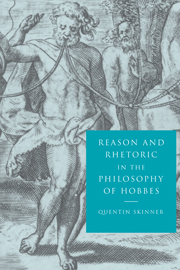Book contents
- Frontmatter
- Contents
- Acknowledgments
- Notes on the text
- Introduction
- PART I CLASSICAL ELOQUENCE IN RENAISSANCE ENGLAND
- 1 THE STUDY OF RHETORIC
- 2 THE POLITICS OF ELOQUENCE
- 3 THE MEANS OF PERSUASION
- 4 THE TECHNIQUES OF REDESCRIPTION
- 5 THE USES OF IMAGERY
- PART II HOBBES AND THE IDEA OF A CIVIL SCIENCE
- Conclusion: Why did Hobbes change his mind?
- Bibliographies
- Index
2 - THE POLITICS OF ELOQUENCE
Published online by Cambridge University Press: 08 February 2010
- Frontmatter
- Contents
- Acknowledgments
- Notes on the text
- Introduction
- PART I CLASSICAL ELOQUENCE IN RENAISSANCE ENGLAND
- 1 THE STUDY OF RHETORIC
- 2 THE POLITICS OF ELOQUENCE
- 3 THE MEANS OF PERSUASION
- 4 THE TECHNIQUES OF REDESCRIPTION
- 5 THE USES OF IMAGERY
- PART II HOBBES AND THE IDEA OF A CIVIL SCIENCE
- Conclusion: Why did Hobbes change his mind?
- Bibliographies
- Index
Summary
THE IDEAL OF THE VIR CIVILIS
When Thomas Wilson first made available to English readers a Roman conception of the ars rhetorica, he saw himself as engaged on an undertaking of far wider significance than that of merely outlining the various definitions and typologies we have so far discussed. He saw himself as retrieving a classical understanding of why it should be regarded as a matter of cultural importance to acquire a mastery of those precise definitions and typologies.
It is true that, according to Wilson and most of his contemporaries, part of the point of studying the ars rhetorica was to advance the cause of Christian as opposed to classical culture. One of the claims that Cox, Wilson and Sherry all emphasise in their pioneering treatises is that, as Sherry puts it, an understanding of rhetoric greatly profits us ‘in the readinge of holye scripture, where if you be ignoraunte in the fygurative speches and Tropes, you are lyke in manye greate doubtes to make but a slender solucion’. Wilson offers a dramatic example in the course of illustrating the trope of synecdoche, the trope he takes to be in play whenever ‘by the signe we understande the thyng signified’. One catastrophic theological error stemming from ignorance of this device is the failure to recognise that, when we eat the bread at communion, we merely ‘remember Christes death, and by Faith, receive hym spiritually’.
- Type
- Chapter
- Information
- Reason and Rhetoric in the Philosophy of Hobbes , pp. 66 - 110Publisher: Cambridge University PressPrint publication year: 1996



